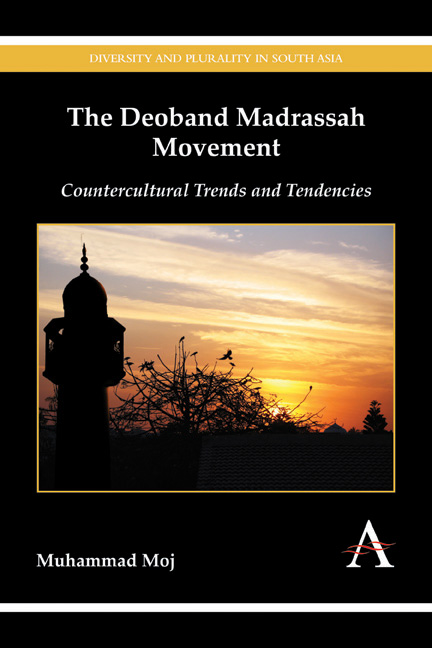Book contents
- Frontmatter
- Dedication
- Contents
- Preface
- Prologue
- Chapter 1 The Deoband Madrassah Movement: Research Context
- Chapter 2 Origin of the DMM: Seeds of a Counterculture
- Chapter 3 The DMM in United India: Activist Countercultural Trends
- Chapter 4 The DMM in Pakistan: Countercultural Politics and Extremism
- Chapter 5 Deobandi Islam: Countering Folk Islam and Popular Custom
- Chapter 6 The DMM versus Mainstream Society: Viewpoints of Deobandi Journals and Students
- Epilogue
- Appendix I The Deobandi Stance vis-à-vis Muslim Groups other than the Barelwis
- Appendix II Countercultural Exposition of the Deobandi Taliban
- Appendix III Interview Guide
- Glossary of Islamic Terms
- References
- Index
- Frontmatter
- Dedication
- Contents
- Preface
- Prologue
- Chapter 1 The Deoband Madrassah Movement: Research Context
- Chapter 2 Origin of the DMM: Seeds of a Counterculture
- Chapter 3 The DMM in United India: Activist Countercultural Trends
- Chapter 4 The DMM in Pakistan: Countercultural Politics and Extremism
- Chapter 5 Deobandi Islam: Countering Folk Islam and Popular Custom
- Chapter 6 The DMM versus Mainstream Society: Viewpoints of Deobandi Journals and Students
- Epilogue
- Appendix I The Deobandi Stance vis-à-vis Muslim Groups other than the Barelwis
- Appendix II Countercultural Exposition of the Deobandi Taliban
- Appendix III Interview Guide
- Glossary of Islamic Terms
- References
- Index
Summary
This book identifies countercultural trends and tendencies in the Deoband Madrassah Movement (DMM) during its 150-year-long history, with a particular focus on Pakistan. Religious schools or madaris (plural of Arabic madrassah: ‘place of learning’) of Pakistan have acquired greater significance since the terrorist attacks of 11 September 2001. Since then, there has been a substantial increase in the literature concerning madaris in Pakistan. However, most of that literature has focused on madaris from the perspective of securitization. According to Malik, ‘Few of those studies are well grounded in empirical research – in fact most of them lack research altogether.’ The majority of recent studies on madaris suffer from ‘sensationalized overgeneralization’ and do not take into account the history of the religious education and the factors influencing the demand and supply of madaris (Malik 2008, 1). Recent research on madaris has also been ‘predicated on observational accounts and anecdotes’ (Ali 2009, 85), while ignoring the social context and historical background (Riaz 2008, 36).
The major focus of post-9/11 madrassah literature has been the rise in the number of madaris and their possible links to extremism. Just before 9/11, the Western media had already begun to highlight the madrassah–terrorism nexus during the rise of the Taliban in Afghanistan. In the year 2000, Jessica Stern, Jeffery Goldberg and Stephen Cohen each published articles that specifically focused on Pakistani madaris and their links with jihadism and terrorism. Immediately after 9/11, as the intensity of this discourse increased, Peter Singer (2001) pointed out that madaris were displacing the public education system and some of these had ‘extremely close ties with radical militant groups and played a critical role in sustaining the international terrorist network’. Andrew Coulson (2004) called madaris ‘weapons of mass instruction’. Even the 9/11 Commission Report referred to madaris as ‘incubators of violent extremism’ (2004, 385). Ali Riaz (2008, 39–40) studied the coverage of nine Western media outlets between 12 September 2001 and 31 March 2005 and identified two thematic similarities with regard to their portrayal of Pakistani madaris: the depiction of madrassah children as enemies-in-the-making and the framing of the madrassah environment as repressive.
- Type
- Chapter
- Information
- The Deoband Madrassah MovementCountercultural Trends and Tendencies, pp. xi - xviPublisher: Anthem PressPrint publication year: 2015



